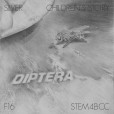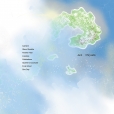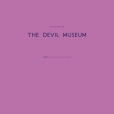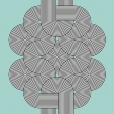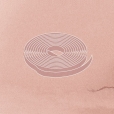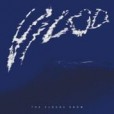Your basket is empty

Hiroyuki Onogawa
August in the Water - Music for Film 1995-2005
Mana
‘Sublime, ethereal minimalism: the first drawing together of Onogawa’s soundtrack compositions, plotting a decade of music for films by cult filmmaker Gakuryū Ishii.
‘Sequenced into an album by Onogawa himself, this retrospective spans a fertile period of collaboration with Ishii, through soundtracks for three remarkable films — August in the
Water (1995), Labyrinth of Dreams (1997), and Mirrored Mind (2005) — where the cinema is texturally and sensually imbued with the spiritual, ambient, dreamlike quality of Onogawa’s music.
‘The sound Onogawa conjures for these films is elegant and patient, often spare or essential in form, but saturated in a strange and otherworldly, poetic emotion and atmosphere. Boundaries are crossed between New Age and science fiction, passing through blissfulness, melancholy, and paranoia, towards enchantments of mood and colour.
‘It’s notable that the compositions on this album straddle the millennium, with a fitting mix of divine and uncertain themes. New listeners might hear links to Mark Snow’s work for the X-Files and Millennium, or the soundtracks of certain future-facing and future-fearing Japanese anime or cyberpunk.
‘Onogawa’s music adds great depth and tenor to the sensory experience of the films themselves, but it stands just as strongly as a listening experience on its own terms; a virtuosic example of Ambient that changes in hue when turned in the light. Remarkably, like Ishii’s films, Onogawa’s work has never been widely available outside of fervid underground fan posts, usually sourced from extremely limited and private CDs limited to Japan.
‘This retrospective seeks to remedy that, presenting Onogawa as one of the great composers of the last three decades.’
‘There’s a playfulness at the heart of Profondo Rosa that’s immediately charming, with a sense of scale and spatialisation in the sounds being toyed with, exploring the strange pleasures and satisfaction in her approach to delightful and fresh feeling sound design. Argentinian composer Aylu is known to be as likely to deploy the sound of a finger click, a fizzy drink being cracked open, or a fly buzzing past the ear, as she is drawn to sampling gorgeous strings or instrumentation. Her debut album for Mana constantly builds
territories that tug at your heartstrings and then have you grinning five seconds later. This versatility and acceleration has often resulted in her music being compared to Footwork…
These compositions give off an air of being very free, very experimental, despite being meticulously artful and studied arrangements on precise and nimble coordinates.’
An ‘electro-acoustic’ approach to UK Garage, allternately banging and evasive, teeming with detail.
‘Combining steppy dance music, lush detail and a diaristic tone, Jack Chrysalis’ debut album dials between music that is destined to catch the ear of the club-goer and the heart of the dreamer.
‘His signature propulsive mutations of organic techno and UK garage sound strongly in tracks like Another Year and Coldharbour, but Chrysalis threads in more introspective moments, which llend a sense of atmosphere and a deeper running mood to the album’s overworld, heightening endorphin hits from the garage swing and affording a little more bittersweetness to its textures and secrets.
‘Whether in rush or retreat, each track on this album emerges with its own emotional resonance. There’s a sense of seasons turning, or a twilight quality that’s hard to fully pin down. “Owl music” became shorthand for Jack’s tunes, a way for Mana to capture a prescient, nocturnal flight within their environment.’
An oneiric, melancholic cross between ambient, soundtrack, and audio drama, conjured from recordings made in the middle of a forest in Lithuania, near the Devil Museum in Kaunas.
‘I listened to the door hinge and I recorded the river, with its small islands of ice brushing up against the banks like a pulse.’
‘Composed during one of London’s endless dark and locked down winters, Fever Dreams is a fantastical, speculative take on high density living. From dark, mouldy rooms, subterranean depths, symbiosis and multi-species entanglements, it cloaks itself in the claustrophobia, excitement and despair of living in a metropolis. It is a work which both celebrates and fears the weeds, spores, vermin and grime of London. The dark fantasies, frustrations, and utopian aspirations of its urban survivors. Frozen plastic bags, cramped living quarters, the kindness of strangers, the desperate unfairness of who gets what and when. Almost getting there but not quite. Being overcome by emotion for no reason. Unexpectedly moved, inexplicably destroyed. The never still, forever unfolding moments which comprise living on top of each other. Sinking and swimming; together/apart.’
‘Swooping, sub-heavy sci-fi from Riz Maslen, under a new moniker.
‘Heavy-lidded and ethereal, its balance of bass weight, mechanical metre, and darkly tinted new age feels like a cinematic re-approach to some of the textures, moods, and themes of her 1996 Laundrophonic maxi, under the alias Neotropic.
‘Stairway 13 folds in decades of experience in sound design and theatre, along with shards and elements abstracted from Riz’ more recent folk-like music, zoning into a deep, retreated, altogether dreamlike and expansive atmosphere. The scale and soundscape is reminiscent of Geinoh Yamashirogumi and their Ecophony album series, resonating to similar frequencies and exploring themes of chaos and rebirth in feature-length form.
‘The four parts spread and swoop as single extended sides across this double LP. Carried by waves of sub bass and heavenly chorus, and later punctuated with autonomic clicks of machinery, whirrs, and pulses, the work forms a gothic, otherworldly ambience. A subtle space opera.’
‘Flits between eerie ambience, environment, and hermetic logic. The music’s timing and sequencing feel distant, the elegant constructions conjured and organised semi-consciously, drawing the listener deeper into the dream… Each neatly tuned conversation and clockwork assemblage harmonises, spinning tantalisingly just out of range and understanding.’
‘Developing a sound-world of drifting, otherworldly atmospheres and strange fusion, these Villalobos-Loderbauer collaborations evade easy categorisation, even compared to the former’s genre-twisting solo offerings. The Clouds Know pulls at their backbone, refining a deft and subtle musical noir built on ambient cues, sparks and claps of electricity, brushed drums, black voids and subterranean bass swoops. Erratic, submerged rhythms make way for expansive fields of crisp, uncanny detail; enchanting, humid environments, dense with the chatter of synthesised insects, the gentle rain of drums, whispering cymbals… There’s a twinkle in the eye and moments of deadpan levity, but the overall mood here is sober and introspective.’


